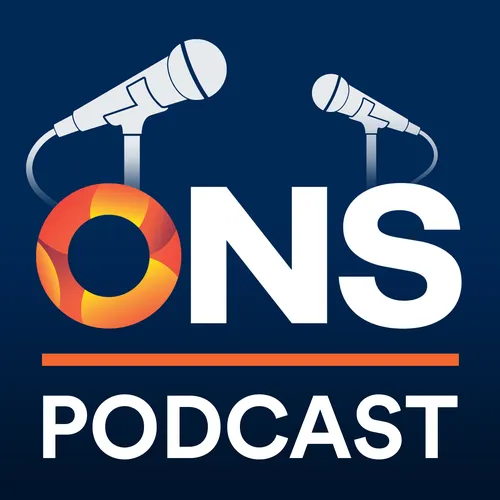
The ONS Podcast
Where ONS Voices Talk Cancer
Join oncology nurses on the Oncology Nursing Society's award-winning podcast as they sit down to discuss the topics important to nursing practice and treating patients with cancer.
ISSN 2998-2308
- Update frequency
- every 7 days
- Average duration
- 34 minutes
- Episodes
- 383
- Years Active
- 2017 - 2025

Episode 220: Oncologic Emergencies 101: Febrile Neutropenia and Sepsis
“It’s actually the nurse who most often first identifies the subtle signs of sepsis in patients. Trust your clinical judgement,” ONS member Laura Zitella, MS, RN, ACNP-BC, AOCN®, nurse practitioner a…

Episode 219: Use Acupuncture and Acupressure to Manage Cancer Symptoms and Side Effects
“Using that view of looking at the whole person, we can provide some acupuncture or acupressure to help maybe reduce anxiety, to help them relax a little bit more, settle their thinking down a little…

Episode 218: Central Venous Catheters: Heparin Harms and Recommendations for Flushing
“Saline is very benign and doesn’t have any risk of harm for the patient. They’re small doses, so we’re not worried about sodium or anything. The risk of heparin is actually quite extensive,” MiKaela…

Episode 217: Support Pregnant and Postpartum Patients During Cancer Diagnosis and Treatment
“Caring for a pregnant patient with cancer is 100% a team approach,” ONS member Chandley Silin, RN, FNP-BC, AOCNP®, nurse practitioner at the Stanford Cancer Center in Palo Alto, CA, told Stephanie J…

Episode 216: Navigate Branded and Nonbranded Patient Education Industry Resources
“What does the patient need to know? What are their knowledge gaps? What are they most in need of? Once you determine the areas you need to pinpoint, branded or nonbranded, then there’s resources out…

Episode 215: Navigate Updates in Oral Adherence to Cancer Therapies
“The nurse is kind of the hub of a spoked wheel. You have your pharmacy and your provider all on the outside edge, but it’s the nurse that’s connecting all of these different support services togethe…

Episode 214: Oncologic Emergencies 101: Syndrome of Inappropriate Antidiuretic Hormone
“Sometimes in our daily routine of taking care of patients, it’s more about looking at the treatment side effects. But look at those wide array of symptoms that can present with an oncologic emergenc…

Episode 213: Meet the ONS Board of Directors: Brant, Burger, and Knoop
What is it like to govern a professional association that serves more than 100,000 oncology nurses? ONS President Jeannine Brant, PhD, APRN-CNS, AOCN®, FAAN, and Directors-at-Large Val Burger, MA, MS…

Episode 212: When Cancer Care Gets Complex: Those Other Oncologic Emergencies
When it comes to oncologic emergencies, early identification and intervention achieves the best outcomes, but some emergencies are harder to recognize. “Oncology nurses are often the first to pick up…

Episode 211: Apply the LGBTQIA+ Lived Experience to Your Patient Interactions
“When we think about how oncology nurses can really be helpful in overcoming barriers to care, it comes back to what we do very well—which is getting to know our patients,” David Rice, PhD, MSN, RN, …

Episode 210: Oncologic Emergencies 101: Spinal Cord Compression
“We call it an oncologic emergency for a reason. Even though it’s usually not life threatening, the longer we wait, the more debilitating and devastating the side effects will be,” ONS member Jennife…

Episode 209: Updates in Chemo PPE and Safe Handling
Hazardous drugs are not just used in oncology, and their health risks for providers go far beyond reproductive toxicities. ONS member MiKaela Olsen, DNP, APRN-CNS, AOCNS®, FAAN, clinical program dire…

Episode 208: How to Have Fertility Preservation Conversations With Your Patients
Talking to patients about how their cancer and treatment affects their fertility can be challenging and complicated for oncology nurses, but we owe it to our patients to have those conversations. Meg…

Episode 207: Oncologic Emergencies 101: Malignant Pleural Effusion
ONS member Roberta Kaplow, RN, PhD, CCRN, AOCNS®, clinical nurse specialist at Emory University Hospital in Atlanta, GA, and member of the Metro Atlanta ONS Chapter, talks with Stephanie Jardine, BSN…

Episode 206: Graft-Versus-Host Disease: Biomarkers and Beyond
“Biomarkers give us information not only to diagnose a patient, but also to see whether a patient is going to have GVHD in the near future, whether a patient is going to respond to the treatment we’l…

Episode 205: COVID-Driven Financial Toxicity and Cancer Care
The inflating price tag of cancer care means that more patients are facing the difficult choice of paying for everyday needs or their cancer treatment. Matthew Banegas, PhD, MPH, MS, associate profes…

Episode 204: How Radiation Is Used in Palliative Care
“There’s nothing more we can do.” How often do patients with cancer hear those words? But ONS member Reanne Booker, RN, MN, a nurse practitioner at Foothills Medical Centre in Calgary, Alberta, Canad…

Episode 203: Oncologic Emergencies 101: Increased Intracranial Pressure
Elevated intracranial pressure is a life-threatening cancer complication, but oncology nurses can take steps to prevent and recognize it in their patients. ONS member Mary Elizabeth Davis, DNP, RN, A…

Episode 202: The Ethics of Oncology Data on Social Media
Social media is an innovative study recruitment and intervention tool, but what are the ethical considerations surrounding its data? ONS member Lisa Carter-Harris, PhD, APRN, ANP-C, FAAN, associate a…
